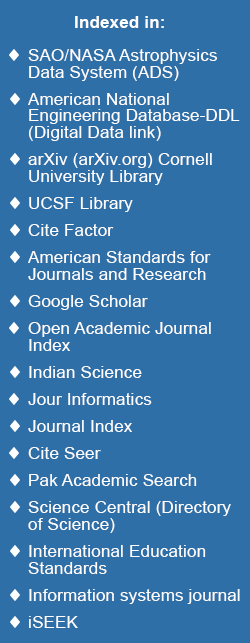ISSN : 2349-3917
American Journal of Computer Science and Information Technology
Significant Potential of Cloud Computing for Healthcare
Ashraf Jaradat*
Department of Computer Science, Jamia Millia Islamia, New Delhi, India
- *Corresponding Author:
- Ashraf Jaradat
Department of Computer Science, Jamia Millia Islamia, New Delhi,
India
Email: ashraf aradt32@gmail.com
Received date: November 03, 2022, Manuscript No. IPACSIT-22-15575; Editor assigned date: November 07, 2022, PreQC No. IPACSIT-22-15575 (PQ); Reviewed date: November 16, 2022, QC No IPACSIT-22-15575; Revised date: November 25, 2022, Manuscript No. IPACSIT-22-15575(R); Published date: December 06, 2022, DOI: 10.36648/ 2349-3917.10.12.1
Citation: Jaradat A (2022) Significant Potential of Cloud Computing for Healthcare. Am J Compt Sci Inform Technol Vol. 10 Iss No.12:001.
Description
Despite all of the concerns, the next turning point in the digital transformation of the healthcare industry is cloud computing. This technology is fully utilized by hospitals and other non-IT-specific businesses. A digital medical component that collects data from hospitals, other institutions, and patient records and reports on the diagnosis makes use of this technology in healthcare. With encouraging signs from the healthcare sector, the global health cloud computing market will expand rapidly in the coming years. For various cloud computing providers' healthcare-related demands and requirements, a comprehensive list of functions is provided. As a result, medical practices rapidly deactivate, expand, and contract new capabilities. The organization's goal is to improve people's quality of life and clinical outcomes. The improvement in a person's health improves the health of the population as a whole, which lowers the cost of healthcare system upkeep. Traditional IT systems or technologies that are unable to interact are still prevalent in many healthcare organizations. This makes it harder for doctors to get accurate and timely information, which makes it easier for them to make better clinical decisions based on more information. The extensive use of cloud-based patient care documentation makes it easier for doctors to share information, as well as the results of interactions with patients and other doctors and treatment. Instead of constructing an onsite data center, employing servers, or hosting the data on a computer, cloud computing outlines how remote servers can store, save, manage, and process data over the internet.
Storing and Accessing Programs and Data over the Internet Rather than on a Computer's Hard Drive
To manage all internal operations related to storage, data processing, transfer, and collaboration, a health service would need to spend a lot on infrastructure and maintenance. Even though healthcare institutions are already experiencing significant expansion, the introduction of cloud computing has significantly altered the situation. The creation of facilities and infrastructure has been aided by this, as have new avenues for medical research, making it multidisciplinary for humanity's benefit. Through technological advancements, cloud computing has enabled medicine in a variety of ways. Cloud computing has clearly helped inpatient treatment in some obvious ways, like providing medical facilities with virtual consultations even in the most remote locations. Cloud-based frameworks have added to the disclosure of different immunizations by clinical researchers and wellbeing experts around the world, supporting experts to give the fundamental data to deliver an intense antigen. The health infrastructure is bolstered by cloud-based services, which make information more accessible and interoperable and provide enormous support. The organization benefits from the cloud's cost-cutting, data accessibility, improved security, and efficiency. Usually, improvements in productivity and efficiency go far beyond cloud and safety. Because they are able to take into account their business, healthcare organizations can increase productivity and provide superior services to their customers. The practice of storing and accessing programs and data over the internet rather than on a computer's hard drive is known as cloud computing. Cloud computing customers do not own the infrastructure; all things considered, they lease it from an outsider provider. Cloud computing and cloud services must have on-demand self-service, broad network access, resource pooling, and rapid elasticity. The practice of storing and accessing programs and data over the internet rather than on a computer's hard drive is known as cloud computing. Cloud computing customers do not own the infrastructure; instead, they rent it from a supplier outside the company. Cloud computing and cloud services must have on-demand selfservice, broad network access, resource pooling, and rapid elasticity. Providers and patients will need time to securely make these data available remotely. Health cloud computing enables organizations to eliminate limitations while improving patient outcomes. Cloud computing helps healthcare providers receive individualized care while also cutting operational costs. In addition, service is improved and workflow efficiency is enhanced as a result of cloud solutions adoption. Patients also receive faster responses from the health industry.
Capital Expenditures for Hardware and Software Acquisition
Healthcare data can be accessed through cloud solutions. It makes it easier for people to keep track of their health. Using cloud computing services, medical professionals provide worldclass solutions. Using user-friendly cloud tools, it is processed quickly to produce concise, easy-to-reference information that enables analysts to evaluate and provide guided therapies. Online health consultation and seamless support for remote health care are made possible by the need to save time for both patients and healthcare professionals. The most cost-effective, time-saving, and customized healthcare solutions are offered by cloud computing. It has the potential to make a significant contribution to clinical trials, illness prediction, and epidemiological and medical research. Through cloud analytics, predictive analyses, AI-based tools, and resources, cloud analytics aid hospitals in making decisions based on evidence. By analyzing the results from various connected medical equipment, cloud analytics can provide a continuous monitoring capability. It's important for healthcare providers to consider which cloud-based solutions they can use to achieve their objectives: advertising, investigation/diagnostics, patient checking, counteraction, and the board. Cloud computing provides support for big data analysis, mobile apps, patient portals, Internet of Things devices, and electronic medical records. Cloud solutions simplify appointment and monitoring management, financial management and planning, and the preservation of patient records and clinical and non-clinical data. In healthcare, cloud computing enhances health information technology. Hospitals can record electronic health records without having to keep physical records by utilizing this technology. The ability to provide on-demand access by utilizing computer resources like storage space and processing power is the primary benefit of cloud computing. The necessary databases can be accessed by hospital workers from any location, and the server effectively handles all functional features. This expanded office in the clinical area at a lesser expense and acknowledges extra understanding inflows, extends the labor force and builds new expansions for emergency clinic offices. Outcall staff can now more easily provide services to inpatient residences thanks to cloud computing. Capital expenditures for hardware and software acquisition are reduced by this technology. If the costs of updating old equipment and purchasing new software and hardware are taken into account, these savings could add up over time. Patient data is easily accessible for use in healthcare planning, delivery, distribution, and insight generation thanks to cloud interoperability. Data will be saved and accessed on the cloud at any time in the future. By streamlining everything from data access to backup and recovery, cloud-based technology will fundamentally alter the health industry's operations.

Open Access Journals
- Aquaculture & Veterinary Science
- Chemistry & Chemical Sciences
- Clinical Sciences
- Engineering
- General Science
- Genetics & Molecular Biology
- Health Care & Nursing
- Immunology & Microbiology
- Materials Science
- Mathematics & Physics
- Medical Sciences
- Neurology & Psychiatry
- Oncology & Cancer Science
- Pharmaceutical Sciences
